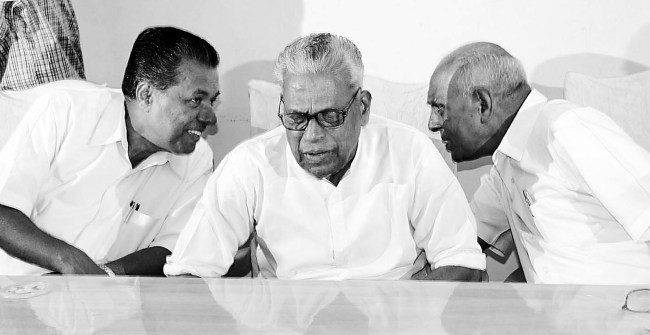Opinion V S Achuthanandan, and a generation raised on memes
He taught the youth how to hold institutions accountable from within. For those who grew up seeing how dissent is criminalised and whistleblowers punished, Achuthanandan’s career was instructive
 V.S. Achuthanandan with Pinarayi Vijayan.(Express Archive)
V.S. Achuthanandan with Pinarayi Vijayan.(Express Archive) I was 18 when V S Achuthanandan walked into our college for the students’ union inauguration. The cheers and slogans that erupted weren’t just from the auditorium. It moved through corridors and stairwells, out into the open blocks, like a signal. There was an unmistakable recognition in the way the space and the people responded to his presence.
He was 93 or 94 then. Still upright, still lucid, still speaking the kind of politics that didn’t need translating. He had just led the Left to power in Kerala, not as a figurehead, but as its most relatable face. What struck me that day wasn’t his age or his memory or his stature. It was the immediacy of his relevance. Here was someone who carried the long arc of Kerala’s political history since the freedom movement and still knew how to speak to a generation shaped by memes and migration. He wasn’t trying to perform a connection. He was the connection.
What made V S Achuthanandan resonate with a generation raised on cynicism was his credibility. For Millennials and the Gen Z, who grew up amid scam seasons, police violence, climate anxiety, and communal flare ups, VS stood as someone whose politics never had to be explained away. You didn’t have to look for footnotes. There was no doublespeak, no strategic silence. Even when his own party, the CPI(M), tried to sideline him, the youth stayed tuned, because he still sounded like he believed politics could mean something.
Take his stance on environmental justice. Long before “climate politics” became campus vocabulary, Achuthanandan’s interventions on the Mullaperiyar dam, Munnar encroachments and against the use of the insecticide endosulfan showed how power must answer to people, not the other way around. For a generation that has grown up watching both private capital and the state extract with impunity, his firmness on these fronts, even when inconvenient to the party, landed as a lesson: Being on the Left isn’t about posturing, it’s about accountability.
He didn’t need to invoke youth to impress the young. He didn’t overuse the word “progressive.” But when VS publicly stood up against moral policing, spoke against land mafias, or took on communal forces with surgical precision, young people didn’t need explanations. His political instinct mirrored their own disgust at status quo hypocrisy and the feeling of being gaslit by institutions that were supposed to protect you. He was a signal that even in high office, you could still dissent.
It helped that he never took the moral high ground to chastise the young. Unlike most political veterans, he didn’t claim to be “above” them. He met them where they were. That’s why campuses welcomed him with thundering cheers, not as a mascot of the past, but as someone who still mattered. In an age of forced positivity and online branding, VS’s appeal was almost rebellious. He did smile, just not always in time for the camera. And yet, he lit up timelines.
Even his silences were studied. In a state where political doublespeak is often defended as strategy, his restraint was radical. He was slow to praise, firm when critical, and resorted to theatrics only when it was necessary. The youth, who have seen politics become performance art, sensed that difference. This was a man who didn’t need to go viral to remain visible. His presence was enough. The stillness was political.
Above all, it was his clarity that held attention. He didn’t offer convoluted justifications for difficult decisions. He drew lines clearly, calmly, and in public. Whether it was his position on the SNC-Lavalin corruption case, taking on party heavyweights like Pinarayi Vijayan or the way he repeatedly stood up for the rights of Dalits and minorities, you knew where he stood. There was no campaign of damage control to be run the day after. For a generation exhausted by political grey zones, this kind of clarity felt like an anchor.
He also taught an entire generation how to hold institutions accountable from within. For those who grew up seeing how dissent is criminalised and whistleblowers punished, Achuthanandan’s career was instructive. He didn’t merely rebel when pushed to the margins, he stayed in the ring. He used the system against itself when needed, but never abandoned the idea that public office must serve public good. That lesson outlasts any ideological label.
VS didn’t trend. He didn’t tweet. He didn’t rebrand. And yet, he remained in memes, in chants, in election rallies, in college murals. For young people often made to feel like their politics are naïve, Achuthanandan was proof that idealism wasn’t a phase. It was a discipline. And it could outlive power, outlast pettiness, and resist erasure.
This farewell must leave us restless. Not because V S Achuthanandan didn’t live long enough, but because few in public life today carry forward the courage to respond to the moment without needing a script — something that he made look so effortless.
akhil.pj@expressindia.com





